Esquire
Barack Obama Needs to Get His Hands Dirty
The former president will have to engage in serious political combat to defend his vision of America from Donald Trump.
By Charles P. Pierce July 3, 2018
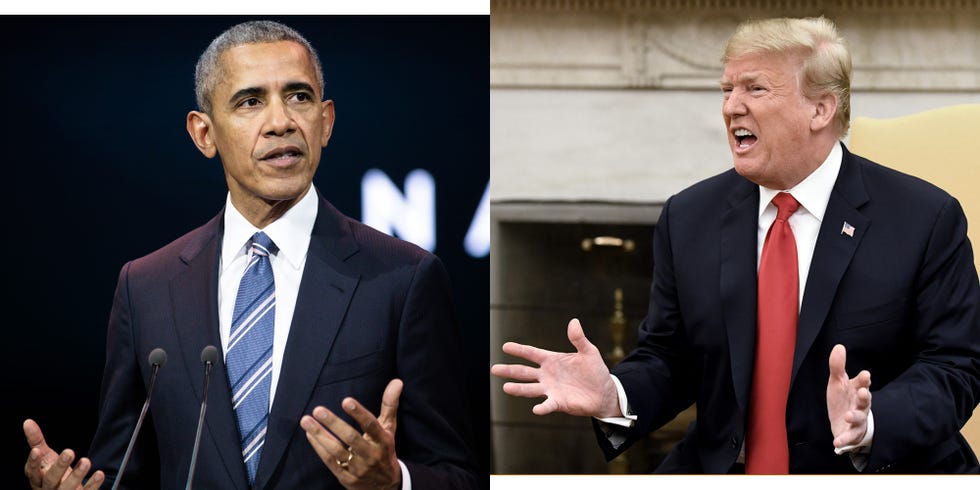 Getty Images
Getty Images
There was a story in The Washington Post: that caught The Cynic’s eye this week. It was about the latest scam with which the rich manage further to immiserate the poor. It was the headline that grabbed The Cynic’s attention. It contained the phrase “monetizing poor people,” which was a little too Soylent Green for The Cynic’s comfort.
“A week later, though, his 2005 Chevy pickup was in the shop, and he didn’t have enough to pay for the repairs. He needed the truck to get to work, to get the kids to school. So Huggins, a 56-year-old heavy equipment operator in Nashville, fished the check out that day in April 2017 and cashed it. Within a year, the company, Mariner Finance, sued Huggins for $3,221.27. That included the original $1,200, plus an additional $800 a company representative later persuaded him to take, plus hundreds of dollars in processing fees, insurance and other items, plus interest. It didn’t matter that he’d made a few payments already. “It would have been cheaper for me to go out and borrow money from the mob,” Huggins said before his first court hearing in April.”
This is, in fact, true. The Mob is more straight-ahead honest with its collection procedures.
“Mass-mailing checks to strangers might seem like risky business, but Mariner Finance occupies a fertile niche in the U.S. economy. The company enables some of the nation’s wealthiest investors and investment funds to make money offering high-interest loans to cash-strapped Americans. Dozens of… investment firms bought Mariner bonds last year, allowing the company to raise an additional $550 million. That allowed the lender to make more loans to people like Huggins. “It’s basically a way of monetizing poor people,” said John Lafferty, who was a manager trainee at a Mariner Finance branch for four months in 2015 in Nashville. His misgivings about the business echoed those of other former employees contacted by The Washington Post. “Maybe at the beginning, people thought these loans could help people pay their electric bill. But it has become a cash cow.””
Moo, thought The Cynic. Moo, moo, moo. These guys are payday lenders in a $5,000 suit.
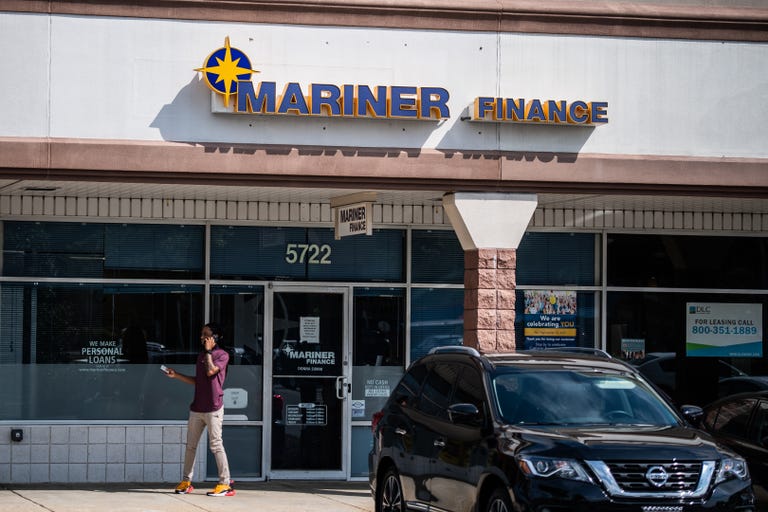 Getty Images
Getty Images
“Among its rivals, Mariner stands out for the frequent use of mass-mailed checks, which allows customers to accept a high-interest loan on an impulse — just sign the check. It has become a key marketing method. The company’s other tactics include borrowing money for as little as 4 or 5 percent — thanks to the bond market — and lending at rates as high as 36 percent, a rate that some states consider usurious; making millions of dollars by charging borrowers for insurance policies of questionable value; operating an insurance company in the Turks and Caicos, where regulations are notably lax, to profit further from the insurance policies; and aggressive collection practices that include calling delinquent customers once a day and embarrassing them by calling their friends and relatives, customers said.”
The Cynic believes—or, rather, knows in the deepest and most cynical part of his cynical heart—that the modern American corporate business model is fraud, that the primary purpose of the American financial system is to make money on money. He believed this before the crash of 2008 and he believes it today. He has believed it under at least the last five previous presidents of the United States. He believes that they believe it as well, and that all five of them, in one way or another, accepted the new business model as being as implacable a force as the wind and tides. This acceptance, the Cynic concludes, was what led directly to the election as president* of a pure product of modern American business fraud.
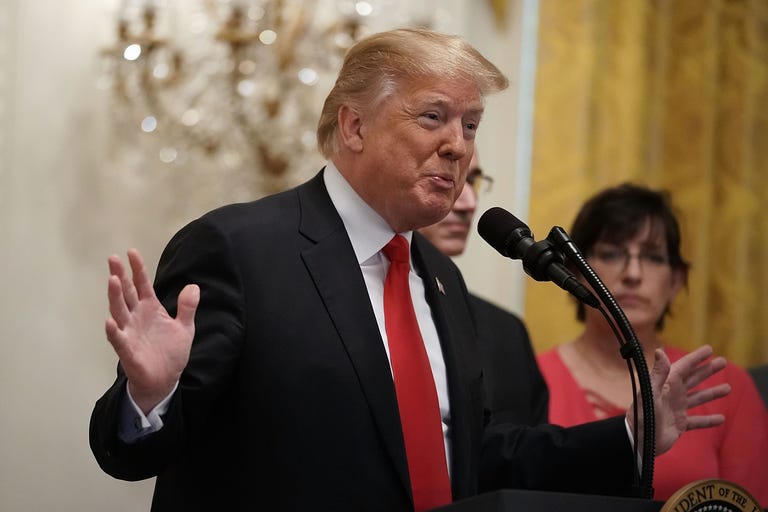 Getty Images
Getty Images
This latest bit of shameless brigandage, thought The Cynic, was the perfect illustration of how the current president* got rich and famous enough to become president*. The guy with the truck is all those subcontractors, the painters and landscapers and glaziers, who trusted his word that they’d get paid and ended up wearing a barrel because the president* had turned reneging on debts into a fine art. The vultures of Mariner Finance were the administration* he put together—chockfull of crooks and sharpers who get fat on broken promises and human misery.
Then The Cynic read further along, and he came to this passage, and he thought about the administration before this one:
“Mariner Finance is owned and managed by a $11.2 billion private equity fund controlled by Warburg Pincus, a storied New York firm. The president of Warburg Pincus is Timothy F. Geithner, who, as treasury secretary in the Obama administration, condemned predatory lenders. The firm’s co-chief executives, Charles R. Kaye and Joseph P. Landy, are established figures in New York’s financial world. The minimum investment in the fund is $20 million.”
Why? The Cynic never has stopped asking this of President Barack Obama. Why Geithner, of all people, when the country was hungry for answers about who had wrecked the world economy and then cashed in the rubble? Why look forward and not back—on torture, and on massive, catastrophic fraud? At the end of the eight years, The Cynic was willing to give Obama a reluctant ‘B.’ He managed to get a national health-insurance bill passed, and damned if it hasn’t been surprisingly durable. He also signed the most sweeping financial reform bill of the previous half-century—although, as The Cynic sadly realized, that wasn’t saying much. He put two very tough liberal women on the Supreme Court. And people did look to him for honest leadership the way they hadn’t looked at politicians in a long time.
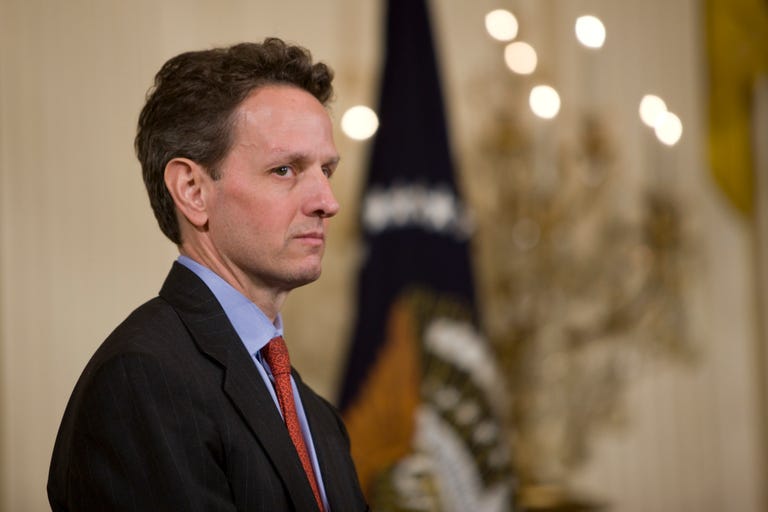 Tim Geithner. Getty Images
Tim Geithner. Getty Images
But the grade never got above ‘B,’ because, essentially, The Cynic believed that Obama never really understood the American people the way they are. He understood them the way he wanted them to be. The constant appeals to the country’s better angels rang hollow through history; even Lincoln couldn’t really summon them, because he got shot in the head, and then Andrew Johnson found political advantage in stirring up the race hatred that still burned throughout the country. The Cynic still believes, as he wrote the first time that he considered the phenomenon of Barack Obama:
“Why would anyone have faith in America, which is not tough but fearful, not smart but stupid, and not shrewd but willing to fall for almost anything as long it comes wrapped in a flag? Why would anyone have faith in Americans? Barack Obama says that he has that faith because of his own life, because he was able to rise to the point where he can be thought of as president of the United States. He is the country’s walking absolution. That’s his reason, the cynic thinks, but it’s not mine. There has to be confession. There has to be penance. Being Barack Obama is not enough. Not damn close to enough.
And it wasn’t. Virulent racism and crazy conspiracy theories attended his every move for eight years. One of the craziest was pushed by the guy who became his successor. This was not an accident.
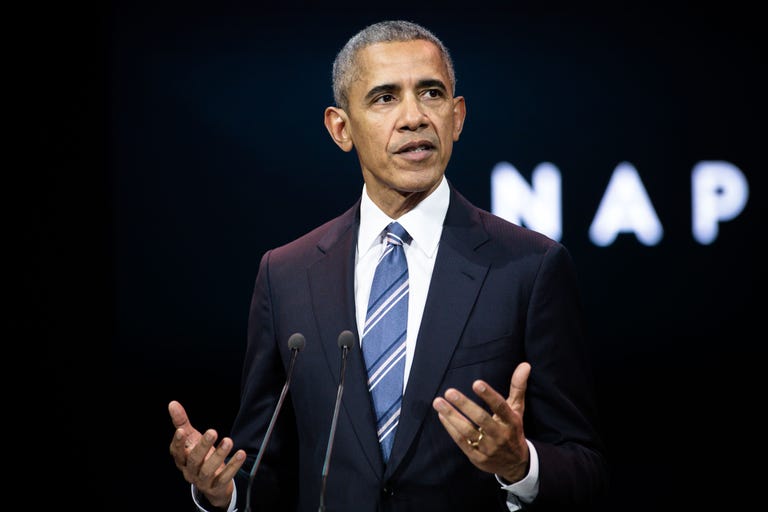 Getty Images
Getty Images
Unless things change drastically in the next two years, Barack Obama and Donald Trump are going to be history’s fraternal twins, their administrations seen as part of the same whole in the period when the survival of the American republic was in greater peril than any time since Lincoln got shot in the head. If he is not careful, The Cynic thought, Barack Obama may well be remembered through history as the president whose glorious vision of the country and considerable personal magnetism made the idea of a President* Donald Trump plausible, if only as an alternative, and as a vehicle for all those parts of the American character that Obama believed the American people could overcome.
All of the forces that produced the current president* were on vivid display during Obama’s eight years in office—the racism, the xenophobia, the lust for “taking our country back.” Guys with guns used to stalk the parking lots of arenas in which Obama was speaking. For eight years, Obama was presented with prima facie evidence that everything he said in that famous speech at the 2004 Democratic National Convention was sadly wrong, that his optimism was misplaced, and that the better angels of our nature were, as they are from time to time, off-duty or rolling sevens in Vegas.
UNLESS THINGS CHANGE DRASTICALLY IN THE NEXT TWO YEARS, BARACK OBAMA AND DONALD TRUMP ARE GOING TO BE HISTORY’S FRATERNAL TWINS.
That he managed to stay sane through that, let alone get as much done as he did, while still maintaining his essential humanity, is eternal testimony to the iron in his spine and to the granite in his character. However, it will not be hard for historians to conclude that his confidence in the American people and his caution in certain policy areas left a huge opening for the dark forces that Obama’s Boston speech had dismissed as phantoms conjured up by pollsters and political consultants. Certainly, Trump’s election has to be seen as a thorough rejection of that speech, just as the administration*’s campaign to roll back Obama’s achievements is a rejection of his policies.
This is what The Cynic thinks when he sees that Tim Geithner is still operating on the modern American business model after a stint as Secretary of the Treasury. Was he completely untouched by the damage done by his lunch pals? Was he deaf to the message that his president brought to the country? Barack Obama left just enough of an opening in just enough places to make the idea of a Donald Trump’s presidency* something more than a punchline. Something like it might have happened anyway, given the raw energy of the naked racial animus that attended every move Obama made.
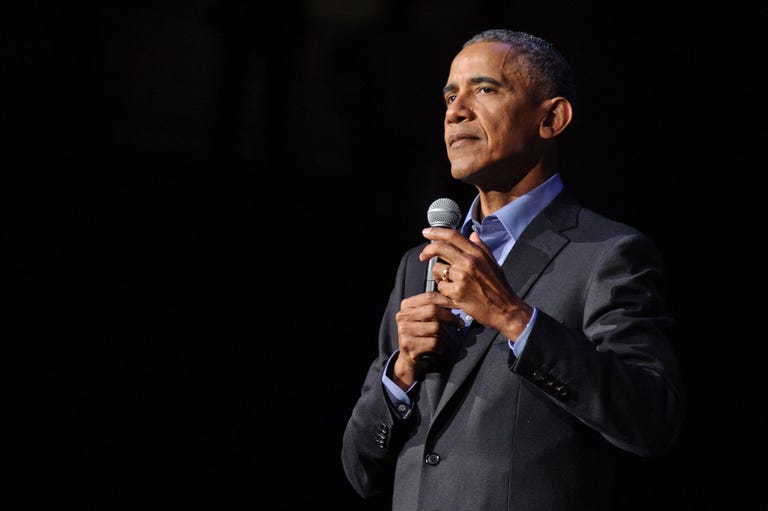 Getty Images
Getty Images
